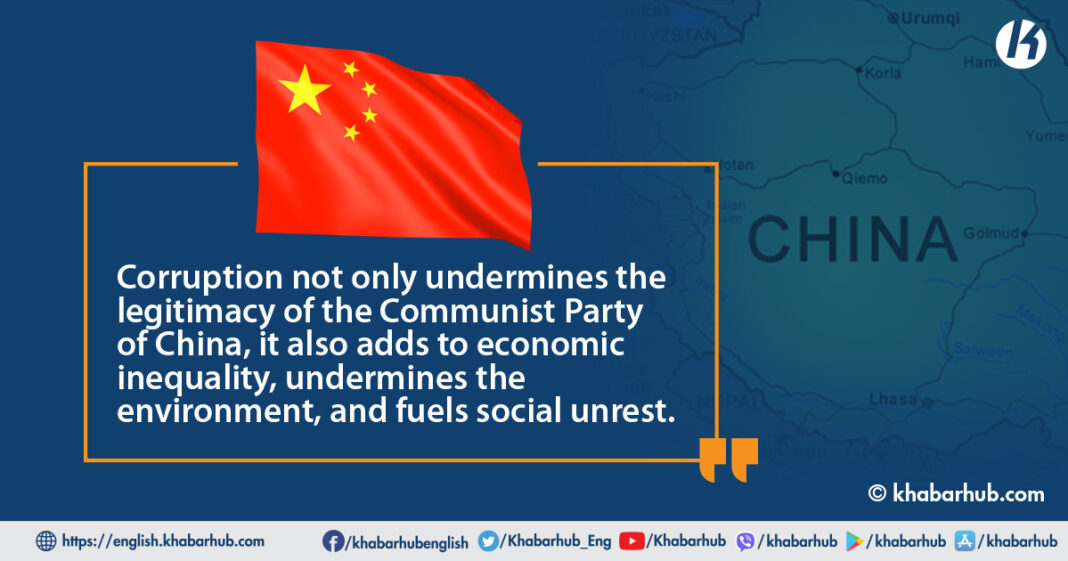Corruption in the Chinese system and society is deeply rooted as new cases keep getting unearthed every now and then from all aspects of the Chinese administration viz. law enforcement, healthcare and education.
Several members of the Chinese Communist Party (CCP), who hold the majority of power in the country, are reportedly embroiled in corruption.
They have been found to be abusing political power for private ends.
Since 2012, approximately 3 million officials have been implicated in the anti-corruption movement, which has focused on the judiciary, finance sector, and law enforcement, among others.
These include state-level officers, deputy state-level officers, dozens of ministerial-level officers, and hundreds of deputy ministerial-level officers.
Primarily, there are two methods adopted by the CCP members for embezzlement of public money for their own benefit.
Public surveys on the mainland since the late 1980s have shown that corruption is among the top concerns of the general public in China.
On one hand, the expenses directed towards private benefits are ostensibly shown as legal official expenditure.
On the other, many corrupt local officials turn their jurisdictions into virtual “mafia states,” where they collude with criminal elements and unsavory businessmen in illegal activities.
In the most recent case, unconfirmed sources suggest that Luo Cheng, former Secretary of the Pingguo Municipal Party Committee of the Guangxi Zhuang Autonomous Region, is suspected of serious violations of discipline and law (a term mostly used by CCP to hide the corruption cases in the Party).
He is currently being investigated by the Autonomous Region Disciplinary Commission and Supervisory Committee. Luo Cheng supposedly joined the Communist Party of China in August 2003.
He served as Director of the Baise City Development and Reform Commission and Director of the Baise Construction Management Office for the Revitalization Planning of the Zuojiang Revolutionary Old Area.
He was appointed as the acting Mayor of Pingguo City in May 2020. In June 2021, he became Secretary of the Pingguo Municipal Party Committee.
Cheng is another addition to the long list of high ranking CCP members and provincial portfolio holders who have been accused of serious corruption.
Some of the prominent names are: (i) Liu Zhenyu, member of the Standing Committee of Xiangxi 2 Tujia and Miao Autonomous Prefecture Committee of Hunan Province, (ii) Long Xiaohua, former Deputy Secretary of Xiangxi Autonomous Prefecture Committee of Hunan Province and former Governor of prefecture people’s government, (iii) Du Xiaozhou, former Secretary of the party committee and Chairman of Shaanxi Yinhan Jiwei Engineering Construction Co. Ltd.
Corruption not only undermines the legitimacy of the CCP, it also adds to economic inequality, undermines the environment, and fuels social unrest.
Besides these, bodies governing sports in China have also been marred by corruption.
Some of the people at the helm of affairs in sports administration being investigated are: (i) Liu Aijie, former Chairman of China Rowing Association and China Canoeing Association, (ii) Yu Hongchen, Chairman of Chinese Athletic Association, (iii) Du Zhaocai, a member of the party group Administration and in[1]charge of football administration, (iv) Wang Xiaoping, Director of the Disciplinary Committee of Chinese Football Association, and (v) Huang Song, Director of Chinese Football Association’s competition department.
Widespread corruption is among the most serious threats to China’s future economic and political stability.
Bribery, kickbacks, theft, and waste of public funds cost at least three percent of GDP.
Corruption not only undermines the legitimacy of the CCP, it also adds to economic inequality, undermines the environment, and fuels social unrest.
Public surveys on the mainland since the late 1980s have shown that corruption is among the top concerns of the general public in China.

